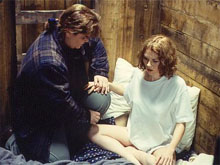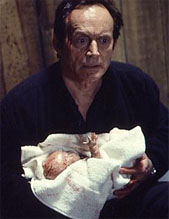May 31, 2005
A column tackling gay issues, gay themes, and just general gayness in television
Out-TakesEt in Arcadia Lesbo
Virgins and Mothers and Dykes, oh my!
So I'm one of the three people in the world who liked Millennium. I recognize this as a personal failing and move on with my life... Actually, no, I really do love the show, particularly the second season, when Chris Carter decided to bugger off back to The X-Files (my first true love) and leave Morgan and Wong to play the Let's Torture Frank Black! game all by themselves (leading them to draw out such a wonderfully mopey performance from Lance Henriksen that I've always associated his voice with the perpetually depressed Morpheus from Neil Gaiman's Sandman). Its combination of religious wankery, amazing scoring and not-entirely-horrible dialogue still brings a smile to my inner misunderstood teenager's face.
 The dames in question. |
But somehow, in watching the run on television (while I was in high school, which should give you an idea of how old I am), I completely missed the episode "In Arcadia Ego." So you can imagine my surprise when I put the second season into the DVD player and was floored by the story of a virgin birth, visited upon a pair of escaped lesbian convicts in Idaho. My love for Frank Black — already a mighty thing in and of itself — was further cemented by his earnest attempts here to make sure these two didn't come to any harm, particularly in the face of the good ol' boy law enforcement network that seems intent on riding its sexist, racist, and homophobic tendencies all the way to the bank. Being on the side of good, however, compels Frank not only to resist, but to actively work for their well-being, even when it means going behind the back of the evil sheriff. Frank Black fights for dames and homos!1 Is it any wonder he's been nominated to save the world?
Quite frankly, you have to admire any episode of anything that contains overwhelmingly positive portrayals of both escaped convict lesbians and Mary-worshipping evangelical Christians. And while I'm hesitant to criticize something that ran in 1998 for not matching up to what I consider 2005's standards of openness, adding an openly lesbian couple to an already-controversial show like Millennium creates an interesting juxtaposition of contentious material. While the show never places homosexuals on par with, say, Gilbert & Sullivan-loving serial killers, there is a sort of unstated mindset that regards both as touchy subjects that need to be handled carefully; however, while the show might have been cutting-edge with its homicidal element, it just can't push the gay envelope with the same intensity.
| In other words, Sonny's allowed to beat a man to death with a pipe, but not allowed to kiss her girlfriend. |
Which is a funny note for an episode that fights so hard to make its transgressive women human beings. When no one else cares about anything except the fact that they're dangerous criminals on the loose, Frank bothers to look up their histories, check their criminal records, and piece together the story of two battered women who found God, each other and God in each other. While you're never supposed to approve of their violent tendencies, you grow to love both women — even the large, brutish bull dyke... oh, heck, especially her — well beyond the labels the men in the system try to force on them.
 |
Really, I'm of two minds when it comes to lesbian snugglies as portrayed on television. On the one hand, there's always the dangerously high probability that it's just eye candy. Really, the amount of two-girl porn in the world should be evidence enough that there's fanservice to be had by making the pretty girls make out, to the point where the purpose of having the pretty girls make out often becomes just having the pretty girls make out. And as much as I enjoy watching the pretty girls make out — and I do — exploitation is nobody's friend. If the only kind of same-sex relationship that gets portrayed on television is fanbait for straight men, it does a real disservice to perceptions of actual homosexual people. Plus it's nice to see gay characters who are not identified solely (or even primarily) by what they do in bed.
And yet, physical affection is also just something people tend to do, particularly when they're in romantic relationships, and even when the participants in those relationships are not camera-ready glamour models (if sex were reserved solely for pretty people, a fair number of us would be in trouble). De-sexing the lesbians does them no favors. A kiss between these two — and if you haven't seen the episode, know that Mary-Pat Green, while a fine actor, will not be winning the Miss America pageant anytime soon — could have been far more about the two of them than about getting a rise of any sort out of the audience.
But in the end, though Sonny and Janette love one another deeply, there's
not even a kiss on the forehead to show for it, in a sort of television adaptation
of the adage about how you really don't want to get caught with a dead girl
or a live boy — or, in Millennium's case, how the dead girl is
easier to show than the live boy.
1Possibly making him the Green Arrow, though I'm not sure.
2And in case you've missed it, when I'm not writing
about queers on TV, I'm working on my M.Div, which means this totally
pushes all my buttons. What can I say? I'm a sucker for being the target audience.
Next time, on Out-Takes: Gene Roddenberry and Trek sex; or, Where No Homo Has Gone Before.
Email the author.
All written content © 2005 by the authors. For more information, contact homer@smrt-tv.com
